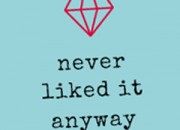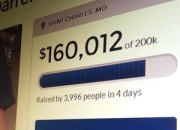A group of hacker activists are developing a suite of tools to strike back at the culture of silence and isolation that surrounds harassment, coercion and assault. There are currently seven such tools, each of which focuses primarily on dating sites and social networks (which, face it, most of us use as dating sites) — depending on the website or app that they are designed for, the tools have different capabilities.
Latest News
After my last breakup, I used College Hunks Hauling Junk because what better way to move on than by ogling UCLA undergrads glistening with sweat as they labored under relics of my past? But there’s something even better, something that might even help you make some extra cash to help to make up for the financial set-back of finding a new place to live. It’s a little site called: Never Liked It Anyway.
Just days after Google announced it would no longer police the names chosen by users on its social network, Facebook decided to take up the battle cry, stressing a name policy it’s had on the books but rarely enforced until now. “Facebook is a community where people use their real identities. We require everyone to provide their real names, so you always know who you’re connecting with. This helps keep our community safe,” says the popular social network on their recently-edited name policy page.
Normally, when you hear about the success rate of a birth control method, it’s given to you as two numbers: the probability of failure per year when used perfectly, and the probability when used “typically.” The difference can range from minor to catastrophic. This is insane. Speaking as an engineer, a system that works well when operated perfectly and fails completely when anything isn’t operated perfectly is basically the textbook description of what a safety system isn’t. But let’s look at the numbers.
Over the past three days, 3,996 people have donated to the GoFundMe campaign of Darren Wilson, the officer who fatally shot Michael Brown. Among his supporters is the KKK, which is raising money for what they term the officer’s “reward/fund.” GoFundMe works with WePay, a money transfer company finicky about its image. WePay has cancelled the campaigns of a number of sex workers across crowdfunding platforms for the flimsiest reasons. But from the looks of this, they’re okay with murderous racism.
The Roxxxy sex robot companion raises profound questions about our relationships to one another and to technology. There’s an obvious conversation we could have about how interacting with a sex robot encourages people to view other people as machines which are ultimately there to serve their own needs. But there’s another lens we can use, which can lead us down an unexpected path, because this device raises many core questions about the development of technology — in a more intimate way than you might expect.
Imagine you decided to tell the story of your sexual assault in an effort to help protect other members of your community. Now imagine someone took your story and turned it into a play. Just how long do you think this play would stick around before going down in flames? Six weeks and counting — and no one seems to care that these accounts belong to real people who never gave their consent for them to be dramatically read on a stage before hundreds of people. Why do you suppose that is?
I don’t need to tell you that two “exotic dancers” were not deemed an acceptable addition to the aforementioned publication’s list of powerful, successful women. But watching Monica Jones appeal her conviction under Arizona’s grossly discriminatory “manifesting prostitution law” (which overwhelmingly targets trans women of color) yesterday, it finally dawned on me — nominating someone in the background via a quiet little e-mail isn’t disruption. Why wait for permission?
“What is a woman?” asks the New Yorker in its most recent issue. It is a compelling question with different answers. In his book Inheritance, the neurogeneticist Sharon Maolem acknowledges that physical sex mirrors a wide spectrum rather than a binary, but the article with the provocative title isn’t about science. It’s about ideology.
So, there it is. The Fifty Shades of Grey movie trailer is out. No matter how hard you’ve been avoiding all discussions about this “phenomenon,” you’re bound to be a little curious. Just how awful will this be? The answer is shocking, if unsurprising: not very. This is unsurprising because long, tedious and incredibly juvenile internal monologues don’t translate well to film, which instantaneously neutralizes one of the most annoying aspects of the book. Yay?
















